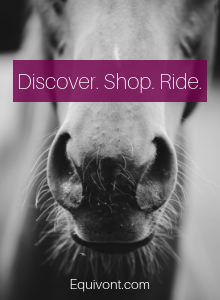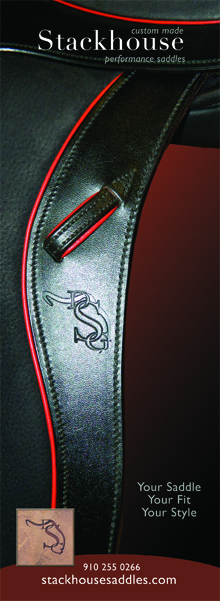Search the Site
Firn's Blog post # 15
For Better or Worse?
Nobody likes that person that’s constantly selling their horse and buying a new one, only to repeat the whole experience a few months later. But nobody likes the newbie on the psychotic young horse who is constantly endangering both herself and everyone around her, either. Whispered conversations in the tack room – or, more realistically, loud conversations in nasal accents at the side of the arena – are as fickle as April: “What does she think she’s doing? She’s way overhorsed. She should sell him and get herself a nice schoolmaster instead.” “She’s going to sell it – again. Seriously. The poor baby. Someone needs to tell her that horses aren’t a commodity, they’re people too. How would she feel being sold on every few months?”
The right thing, as usual with horses, is not the same for anyone, but it seems to lie somewhere between the two extremes. Obviously, if you’re going through horses faster than most people go through T-shirts, then it’s probably not the horses that are messed up. But if you’re forever getting dumped and you hate riding and you’re holding onto Ponykins because he’s your baby, you’d probably be better off with a schoolmaster. Yet most of the time the situation is not extreme.
Let’s imagine a common scenario. Your horse is not a complete psychopath. You’ve had him for maybe two years. Even though he is kind of green, he has not repeatedly tried to kill you. But for the past month or two, he’s not been going the way he should be. He’s not making progress. In fact, it feels like he’s regressing. He doesn’t do anything truly terrifying, per se, but you’re starting to get pretty scared. You’ve fallen a couple times. He’s tossed a couple of naughty bucks and spooks at the jumps more than he used to. He’s fine when your trainer rides him, and you’ve spent a small fortune on the vet, chiro, natural horsemanship cowboy from down the road, supplements, dentist, saddle fitter, etc., only for nobody to find anything that’s really wrong.
Now what?
In honesty, there is no black-and-white answer to this question, for the simple reason that horses are horses and people are people: there is no black and white when it comes to either of them. Emotionally, I often want to side with keeping the horse. I find it really easy to disrespect someone who loads Blaze on the trailer within two weeks after he tossed out his first buck. But maybe that’s just me: I’ve never had a ready-made horse. It’s so ingrained in me that I won’t get anywhere without some blood, sweat and tears that I kind of take it for granted that horses will give me issues.
On the other hand, I know a few people that I would happily tell to sell it. As soon as possible. Preferably to the salami factory. Okay, so I’m kidding about the salami.
Usually, though, these are the owners for whom it was a really bad idea from the start. Ammies (or their kids) who can’t really ride and don’t actually take lessons, riding lively young horses with a mischievous streak the size of China. People who just really don’t click with their horses and never have. I know how that goes, and I know that they have absolutely no control over it. As a (semi) professional trainer, I get given anything with four legs and told to ride, and ride I shall, or not get paid. But there have been a few horses that I was really quite happy to see the back of. None of them were truly bad horses (there are almost no horses that are truly bad), and many of them were actually pretty good horses. But I just couldn’t bring myself to get along with them, and they hated me equally. I could school them, and they would learn, but if they’d been mine, I would have sold them so fast their heads would spin. If I’m going to buy a horse – most especially a riding horse for myself – I’m going to have to feel some form of a connection or attraction to it. Not its colour, conformation, size, breed, talent or even level of training – to its very heart. There are some horses that make my heart sing, and I can’t explain why. Those are the horses I want.
But there are some things a horse buyer does have control over. Mostly, their own brains. And unfortunately, dreams can easily cloud judgment. It’s fine and well for me to say I bought Magic because something in him touched me the way a country singer touches the strings of a guitar, making everything tremble and stand to attention in one responsive glorious note. But on the other hand, if he was too young or too small or the wrong breed or usually lame or had a habit of squashing people against the stable wall*, I wouldn’t have bought him no matter how poetic I could get about the way he made me feel. You have to be sensible. I bought Magic because he made me feel amazing, but I also bought him because he was 15.2 hands, a thoroughbred, gelded, green but never nasty, sound, gentle and had every bit of talent he needed for what I wanted. Oh, and he wasn’t exorbitantly expensive. Don’t forget that bit.
So to make a disgusting generalisation, and one which has so many exceptions that it may be more exception than rule, I could say: If it was never the right horse for you in the first place and now it has become a danger to your health, sell it.
But let’s be real. Most of us are not idiots who go out and buy it because it has a heart-shaped star. Most of us made smart decisions. We can’t all buy packers with ridiculous price tags; some of us have no choice but to buy the sweetest greenie we can find and bring it on under the watchful eyes of our instructors. And what do we do when the wheels come off?
I know what I did. I bought a horse that was a bit green and a bit daunting, but that I knew was gentle and generous to the core without a mean bone in his body. Also my instructor said we’d be fine (listen to your instructor, folks). And he did what young horses do – he went through a tough patch. We’d been jumping 90cm easily. We were struggling to jump 60cm without wanting to die. He overjumped, bucked, stopped, and spooked. I clutched, pulled, kicked, screamed and cried. But somewhere in there was a horse that ignited something inside me. He was just sensitive, and young, and confused, and I didn’t really know how to handle him. For months, we both had no confidence. My dreams of taking him up the levels seemed light-years away; I was much too scared to even go jump cross-rails at a schooling show.
But we stuck with each other. What else could we do? He was the nicest horse I had ever had and, at that time, could even dream of having. I was the only person he knew that was always there /wanting /to love him and to draw the best out of him even if I didn’t always succeed. He knew about the wanting, and I knew about his heart.
Our confidence still isn’t what it should be. But we’re going places now. We’re moving forward. We’re still not jumping 1.10m or 1.20m, but we’re jumping /better/. Some days we become two halves of one whole. And if we’d never had the tough times to guts through, we wouldn’t have the relationship we’ve got now.
I don’t know if horses know someone has quit on them. I think when horses are sold, especially out of a horse-rider relationship that was no good, they just move right on and deal with the life they have today. Horses are good at that.
But I do know that horses know when somebody didn’t quit. I know they know when there’s been bad times and the one constant was the person that was right for them from the start and still wanted them.
And maybe I’m being kind of out there now, but when I look at the way Magic trusts me now compared to the way he did before, it makes me want to believe that they return the favour.
Just say no.
Nobody likes that person that’s constantly selling their horse and buying a new one, only to repeat the whole experience a few months later. But nobody likes the newbie on the psychotic young horse who is constantly endangering both herself and everyone around her, either. Whispered conversations in the tack room – or, more realistically, loud conversations in nasal accents at the side of the arena – are as fickle as April: “What does she think she’s doing? She’s way overhorsed. She should sell him and get herself a nice schoolmaster instead.” “She’s going to sell it – again. Seriously. The poor baby. Someone needs to tell her that horses aren’t a commodity, they’re people too. How would she feel being sold on every few months?”
The right thing, as usual with horses, is not the same for anyone, but it seems to lie somewhere between the two extremes. Obviously, if you’re going through horses faster than most people go through T-shirts, then it’s probably not the horses that are messed up. But if you’re forever getting dumped and you hate riding and you’re holding onto Ponykins because he’s your baby, you’d probably be better off with a schoolmaster. Yet most of the time the situation is not extreme.
Let’s imagine a common scenario. Your horse is not a complete psychopath. You’ve had him for maybe two years. Even though he is kind of green, he has not repeatedly tried to kill you. But for the past month or two, he’s not been going the way he should be. He’s not making progress. In fact, it feels like he’s regressing. He doesn’t do anything truly terrifying, per se, but you’re starting to get pretty scared. You’ve fallen a couple times. He’s tossed a couple of naughty bucks and spooks at the jumps more than he used to. He’s fine when your trainer rides him, and you’ve spent a small fortune on the vet, chiro, natural horsemanship cowboy from down the road, supplements, dentist, saddle fitter, etc., only for nobody to find anything that’s really wrong.
Now what?
In honesty, there is no black-and-white answer to this question, for the simple reason that horses are horses and people are people: there is no black and white when it comes to either of them. Emotionally, I often want to side with keeping the horse. I find it really easy to disrespect someone who loads Blaze on the trailer within two weeks after he tossed out his first buck. But maybe that’s just me: I’ve never had a ready-made horse. It’s so ingrained in me that I won’t get anywhere without some blood, sweat and tears that I kind of take it for granted that horses will give me issues.
On the other hand, I know a few people that I would happily tell to sell it. As soon as possible. Preferably to the salami factory. Okay, so I’m kidding about the salami.
Usually, though, these are the owners for whom it was a really bad idea from the start. Ammies (or their kids) who can’t really ride and don’t actually take lessons, riding lively young horses with a mischievous streak the size of China. People who just really don’t click with their horses and never have. I know how that goes, and I know that they have absolutely no control over it. As a (semi) professional trainer, I get given anything with four legs and told to ride, and ride I shall, or not get paid. But there have been a few horses that I was really quite happy to see the back of. None of them were truly bad horses (there are almost no horses that are truly bad), and many of them were actually pretty good horses. But I just couldn’t bring myself to get along with them, and they hated me equally. I could school them, and they would learn, but if they’d been mine, I would have sold them so fast their heads would spin. If I’m going to buy a horse – most especially a riding horse for myself – I’m going to have to feel some form of a connection or attraction to it. Not its colour, conformation, size, breed, talent or even level of training – to its very heart. There are some horses that make my heart sing, and I can’t explain why. Those are the horses I want.
But there are some things a horse buyer does have control over. Mostly, their own brains. And unfortunately, dreams can easily cloud judgment. It’s fine and well for me to say I bought Magic because something in him touched me the way a country singer touches the strings of a guitar, making everything tremble and stand to attention in one responsive glorious note. But on the other hand, if he was too young or too small or the wrong breed or usually lame or had a habit of squashing people against the stable wall*, I wouldn’t have bought him no matter how poetic I could get about the way he made me feel. You have to be sensible. I bought Magic because he made me feel amazing, but I also bought him because he was 15.2 hands, a thoroughbred, gelded, green but never nasty, sound, gentle and had every bit of talent he needed for what I wanted. Oh, and he wasn’t exorbitantly expensive. Don’t forget that bit.
So to make a disgusting generalisation, and one which has so many exceptions that it may be more exception than rule, I could say: If it was never the right horse for you in the first place and now it has become a danger to your health, sell it.
But let’s be real. Most of us are not idiots who go out and buy it because it has a heart-shaped star. Most of us made smart decisions. We can’t all buy packers with ridiculous price tags; some of us have no choice but to buy the sweetest greenie we can find and bring it on under the watchful eyes of our instructors. And what do we do when the wheels come off?
I know what I did. I bought a horse that was a bit green and a bit daunting, but that I knew was gentle and generous to the core without a mean bone in his body. Also my instructor said we’d be fine (listen to your instructor, folks). And he did what young horses do – he went through a tough patch. We’d been jumping 90cm easily. We were struggling to jump 60cm without wanting to die. He overjumped, bucked, stopped, and spooked. I clutched, pulled, kicked, screamed and cried. But somewhere in there was a horse that ignited something inside me. He was just sensitive, and young, and confused, and I didn’t really know how to handle him. For months, we both had no confidence. My dreams of taking him up the levels seemed light-years away; I was much too scared to even go jump cross-rails at a schooling show.
But we stuck with each other. What else could we do? He was the nicest horse I had ever had and, at that time, could even dream of having. I was the only person he knew that was always there /wanting /to love him and to draw the best out of him even if I didn’t always succeed. He knew about the wanting, and I knew about his heart.
Our confidence still isn’t what it should be. But we’re going places now. We’re moving forward. We’re still not jumping 1.10m or 1.20m, but we’re jumping /better/. Some days we become two halves of one whole. And if we’d never had the tough times to guts through, we wouldn’t have the relationship we’ve got now.
I don’t know if horses know someone has quit on them. I think when horses are sold, especially out of a horse-rider relationship that was no good, they just move right on and deal with the life they have today. Horses are good at that.
But I do know that horses know when somebody didn’t quit. I know they know when there’s been bad times and the one constant was the person that was right for them from the start and still wanted them.
And maybe I’m being kind of out there now, but when I look at the way Magic trusts me now compared to the way he did before, it makes me want to believe that they return the favour.
Just say no.






